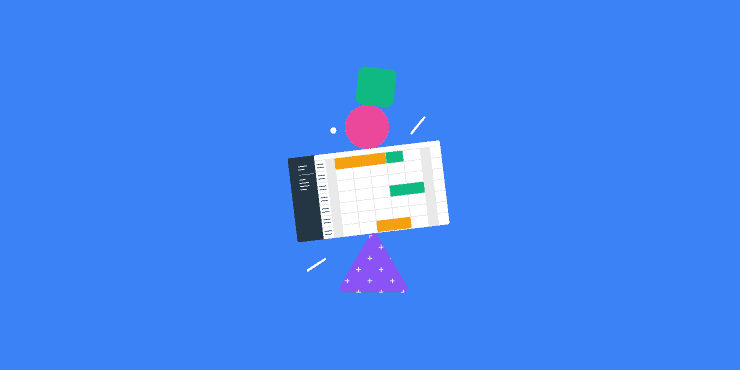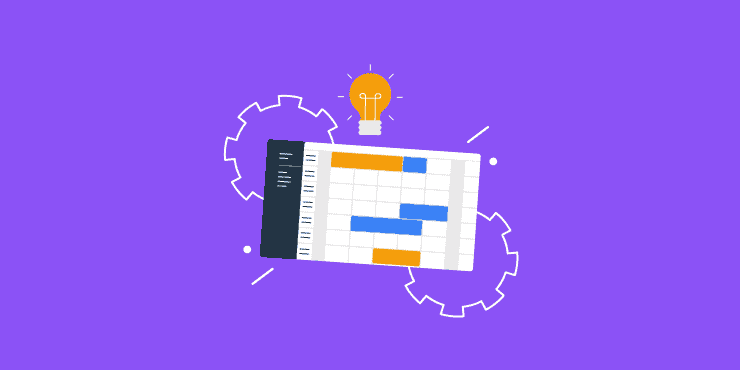From clever ways to structure your schedule to apps that keep distractions at bay, the 15 tips we share in this article will help you operate at peak productivity.
Imagine having the structure and focus to churn through your daily to-do list with ease. No more wasted time or stressing about unfinished tasks! With these simple but powerful productivity boosters, you’ll be unstoppable.
So, let’s not waste another second and just jump straight into it!
1. Get rid of distractions
Humans have a complicated relationship with notifications. Some people get powerful hits of dopamine every time they hear a ping or a buzz from their device. Other people feel stress and anxiety.
However you feel about them, most of us are now so affected by our notifications that we don’t even need to have one in order to be distracted! Simply the anticipation of a notification is enough to disrupt our productivity.
If you want to improve productivity, you need to remove these distractions. There are a couple of ways you could do this.
You could block out specific windows of time throughout the day to check your notifications. For example, first thing in the morning, before lunch, and an hour before your working day ends.
For the rest of the day you could keep your emails tab (or the site you’re prone to checking) closed, so that you’re not tempted to check it.
You can also set reminders via a calendar app, such as Google Calendar, to ensure you don’t accidentally forget to check your notifications!

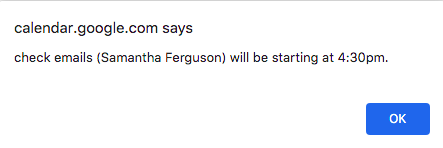
Another – perhaps stronger – way to eliminate these distractions is to block certain apps and websites on your computer. For example, if you check Reddit every ten minutes then you can temporarily block the site on your computer to avoid the temptation.
A quick and simple way to do this is by installing the free Chrome extension, Stay Focusd. After installing to your browser you simply visit the site you want to block and click “Block this entire site”:
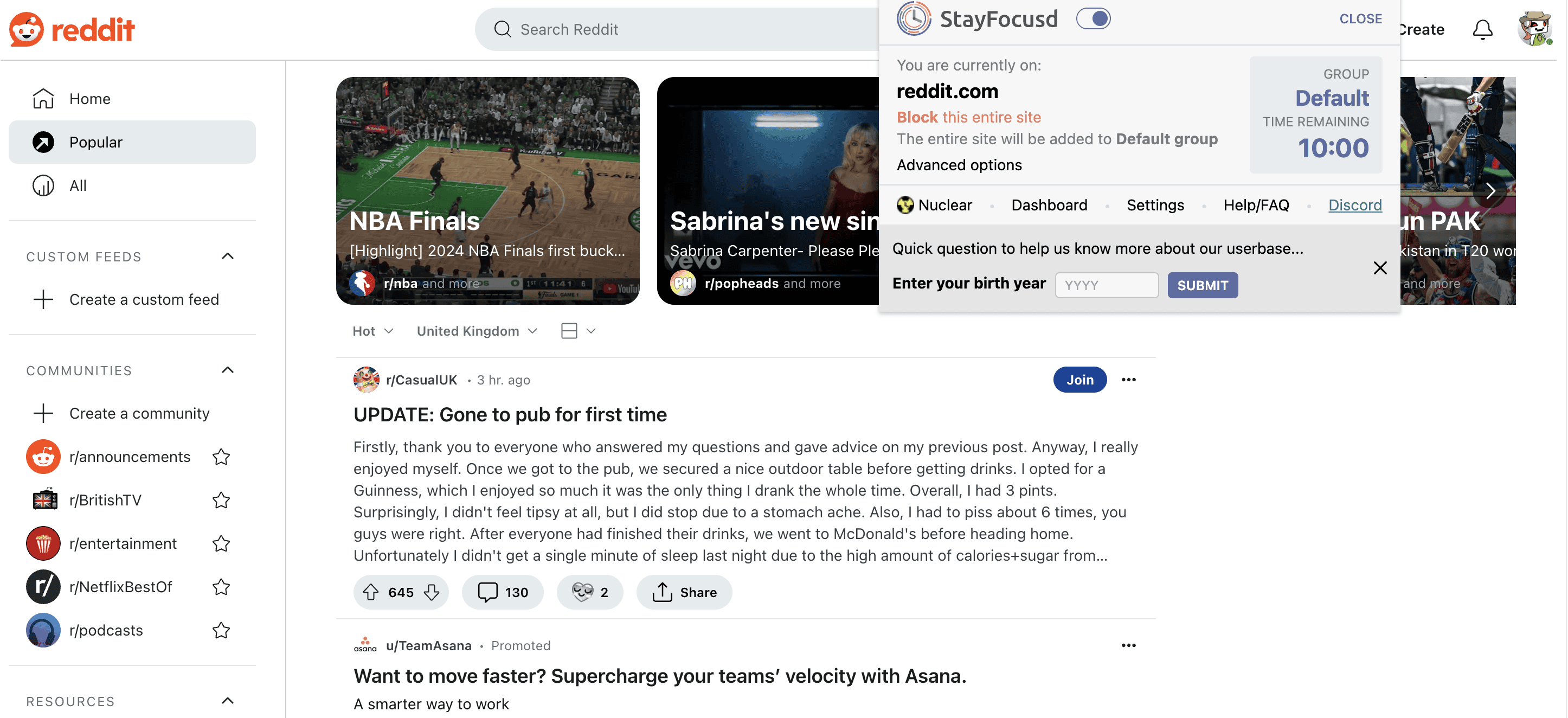
From there, you have ten minutes remaining until the site is blocked:

When you try to visit your blocked sites you’ll receive this message:
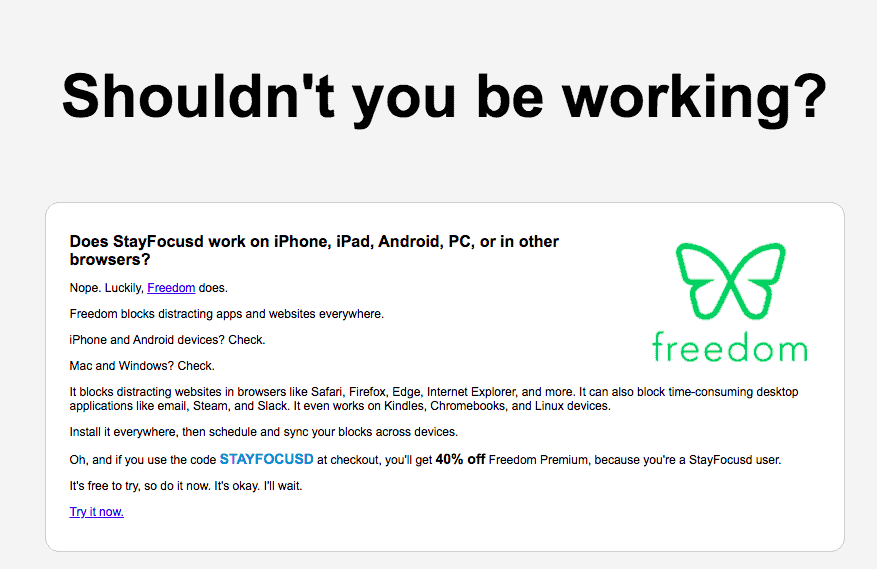
This is a great way to manage your time on social media and boost your productivity. It’s easy to unblock your sites later by heading to the Settings tab:
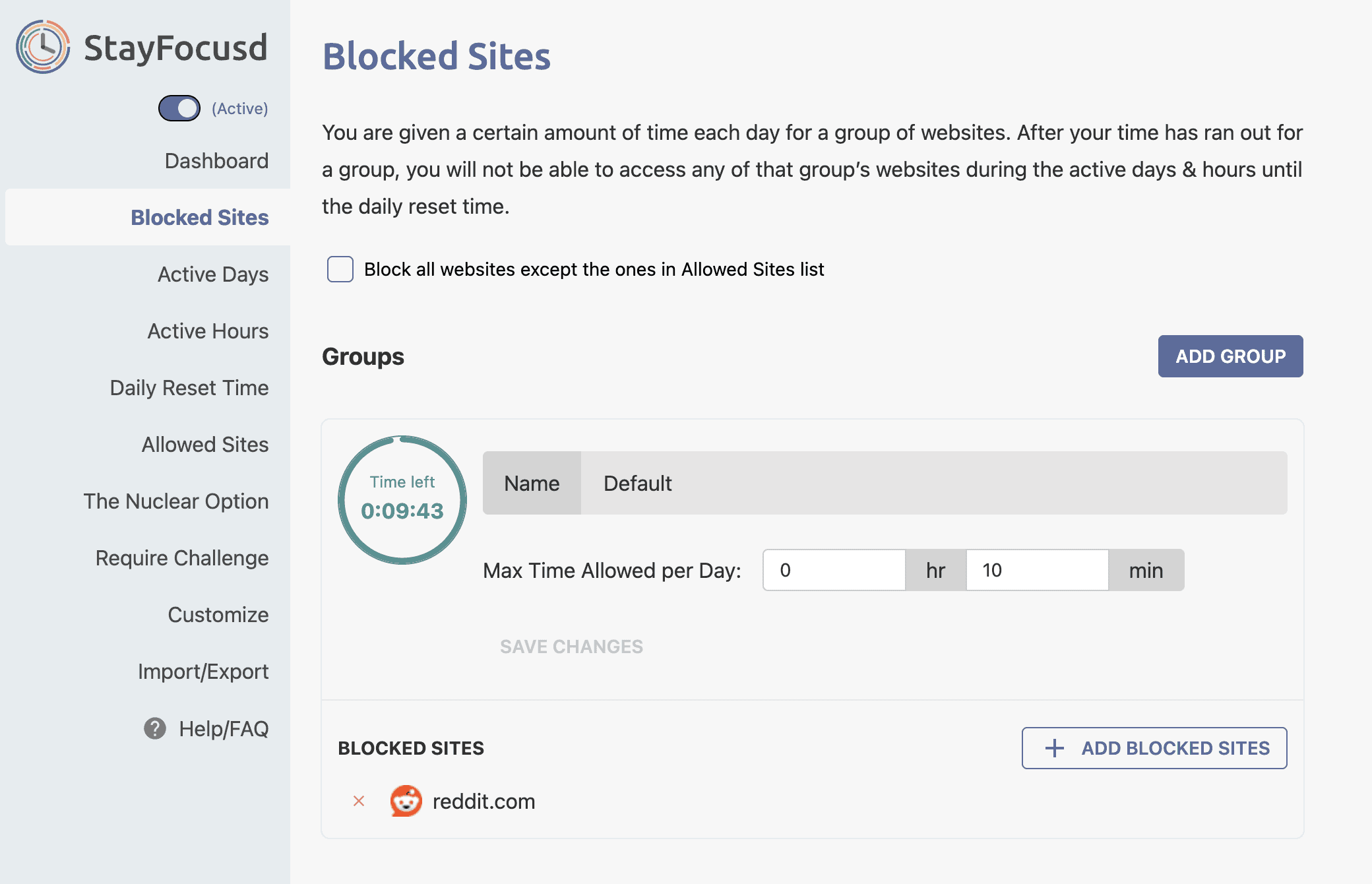
2. Use a project management system
Why struggle trying to manage productivity on your own when there are great tools out there to help you?
Using a project management system, like Project.co, is a great way to keep all of your projects in one place and ensure they remain on schedule.
Our discussions tab is perfect for keeping all of your project communications in one clear, centralised place:
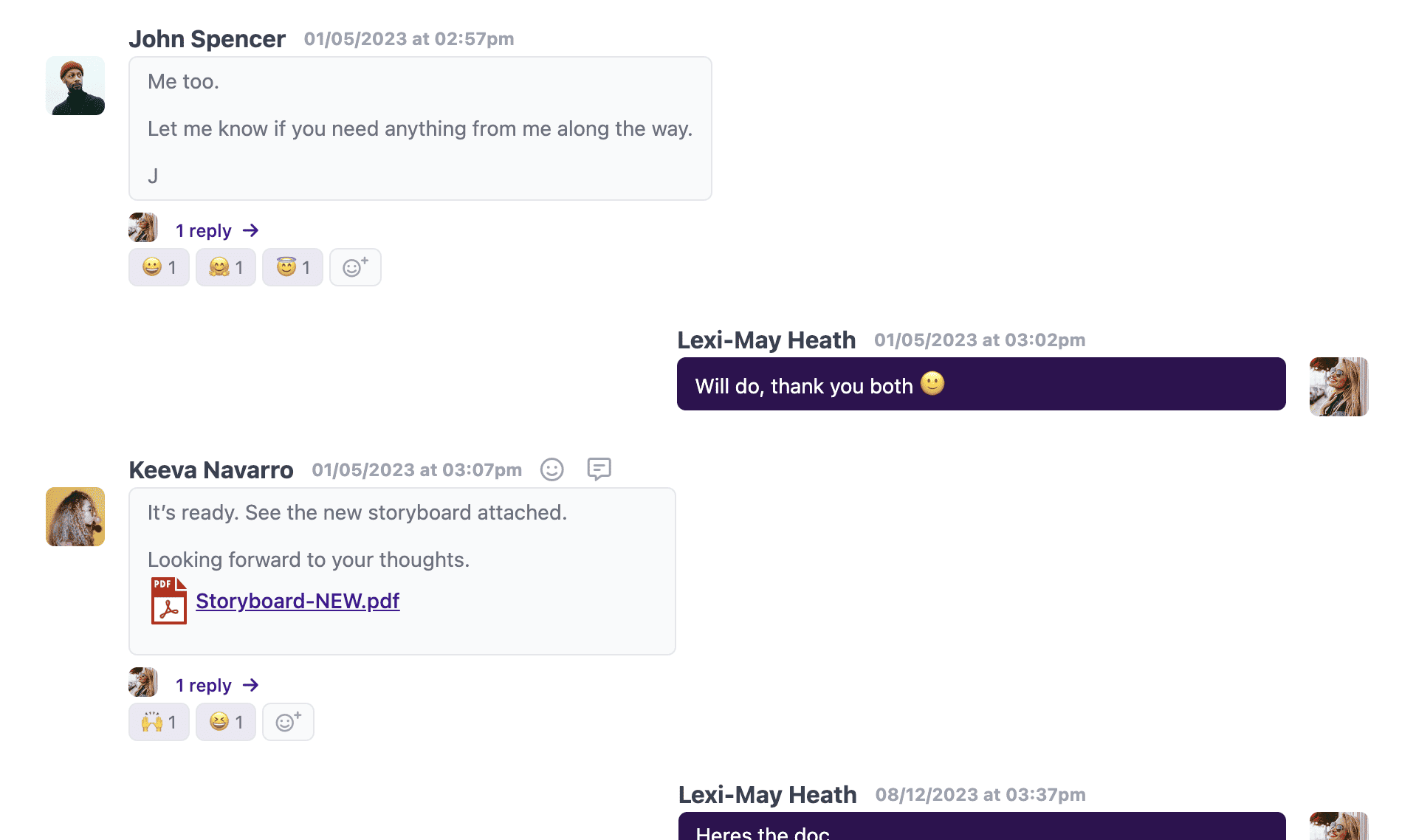
So no more time wasted digging through endless emails!
Plus, our tasks tab can also boost your productivity by keeping your to-do list in one, easy-to-manage place.
It’s easy to add tasks, and you can assign dates and team members in seconds:
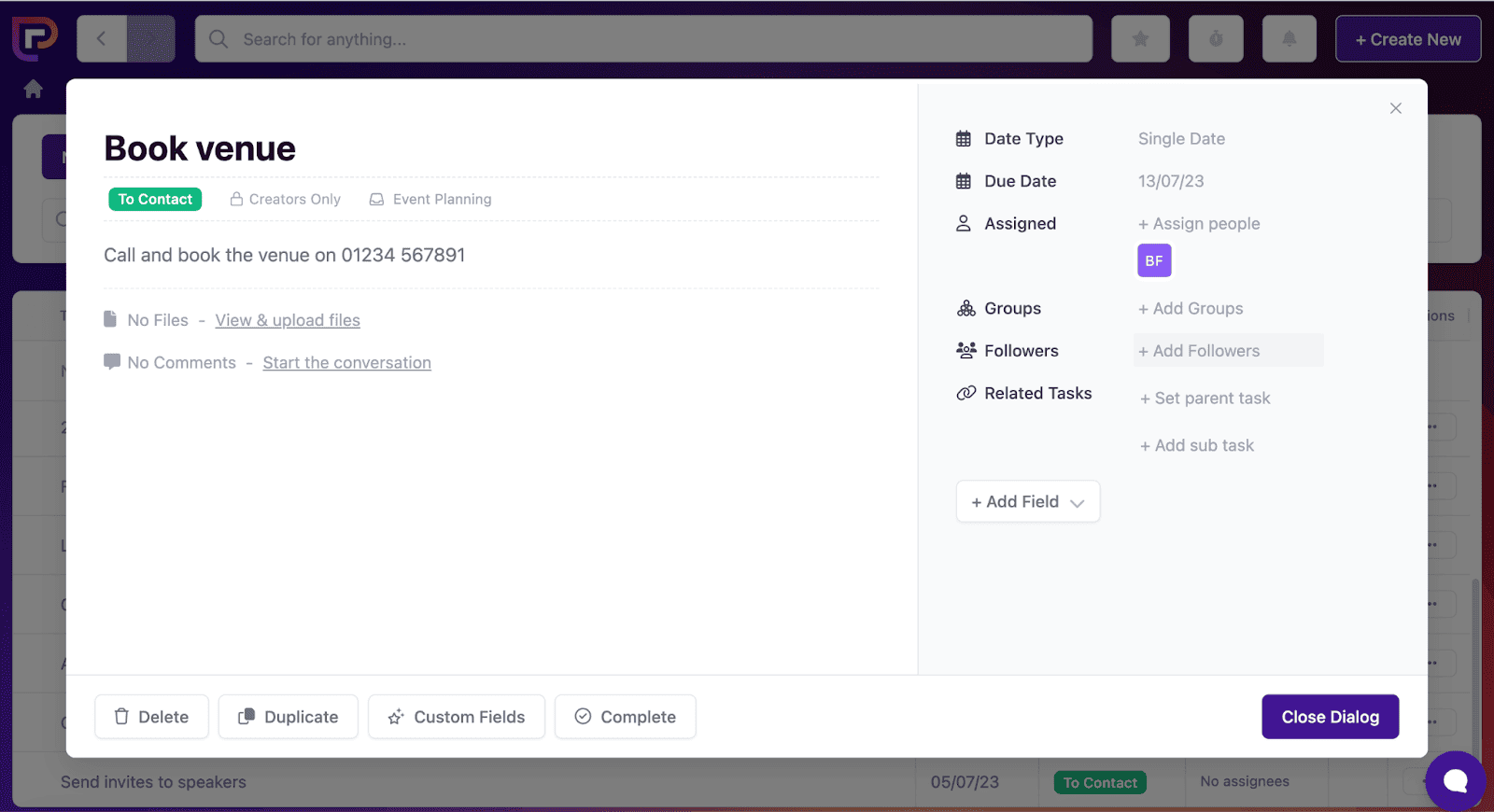
Tasks can also be ticked off instantly when completed, so you can quickly move on to the next one.
3. Implement the 2 minute rule
The two minute rule is simple:
This not only outlines a clear process for how to prioritise your tasks, it also reduces the possibility of wasting time re-reading things.
For example, if a colleague emails you with a question that you can quickly answer then you should respond immediately.
Otherwise, you’re probably going to waste more than 2 minutes by re-reading the email later!
There’s another 2 minute rule that’s worth mentioning here, too. This is the 2 minute rule for building healthy habits.
The idea is that if you have a task you’re dreading and avoiding, simply commit to doing it for 2 minutes. You’ll probably find yourself doing it for a lot longer, and this can help you to build up a habit.
This rule is championed by James Clear, author of the New York Times bestseller, Atomic Habits. Here he is explaining it (coincidentally, in roughly 2 minutes!):
4. Create a to-do list
A to-do list is a great way to remain productive because it allows you to outline everything you want to achieve that day, and it gives you a goal to work towards.
However, the old paper to-do list is prone to getting lost or damaged – plus it’s not that great for the environment!
A project management system – or to-do list app – is a much better way to keep track of your tasks.
At Project.co, we have a free to-do list template to help users get started. With our tasks functionality you can add as many items to your to-do list as you want, while also assigning each task a due date, a person, and any notes or attachments that may help.
5. Use an email declutter app
Email has been around for a long time now, and while there are some smart features available, such as Gmail’s auto response feature:
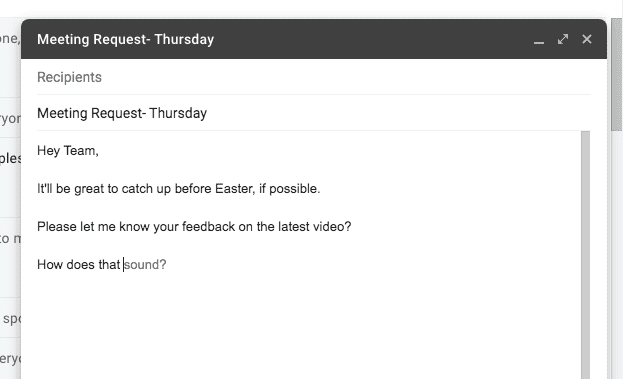
The way we use email is largely the same as it’s always been.
And this can be a huge drain on productivity.
Our inboxes are crowded.
We get CC’d in stuff that doesn’t require any action from us.
Worst of all, we still get spam!
Reducing the amount of unnecessary time you spend in your inbox is a great way to improve your productivity. And there are decluttering apps out there that can help you do just that. One example is Spark.
Spark automatically categorises and prioritises your emails. Learning from your past behaviours, it filters out the emails that don’t matter and makes sure you see the ones that do.
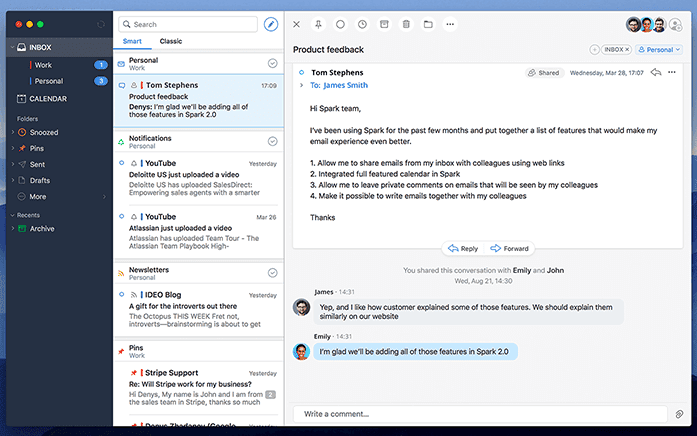
You can also use the app to assign emails to different team members, and even put your inbox on snooze.
6. Snooze your notifications
It’s easy to feel an expectation to be constantly available online these days.
This kind of constant availability can be terrible for productivity. Every distraction – no matter how small – can increase your stress and reduce the speed at which you work.
So, if you’re going to snooze your inbox, you might as well snooze all of your other communication tools, too – like Slack, for example.
Slack is a staple in many businesses, with the app seeing around 40 million daily active users.
If your company uses Slack, it’s easy to put your notifications on snooze if you want to get stuck into an important project. Just click on your profile icon and select how long you want to pause your notifications for:
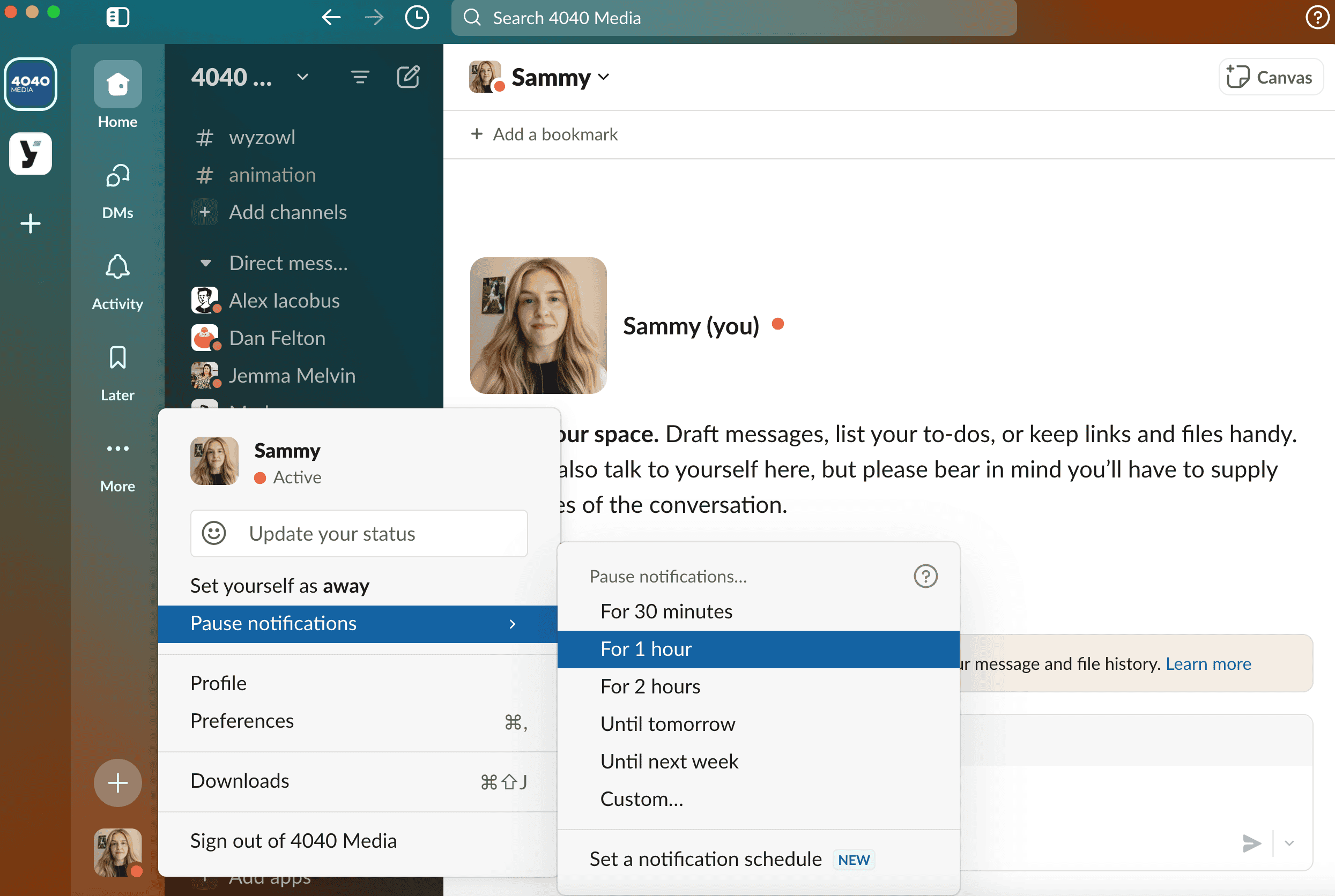
You can also add a status to let your team know why you’re on snooze:
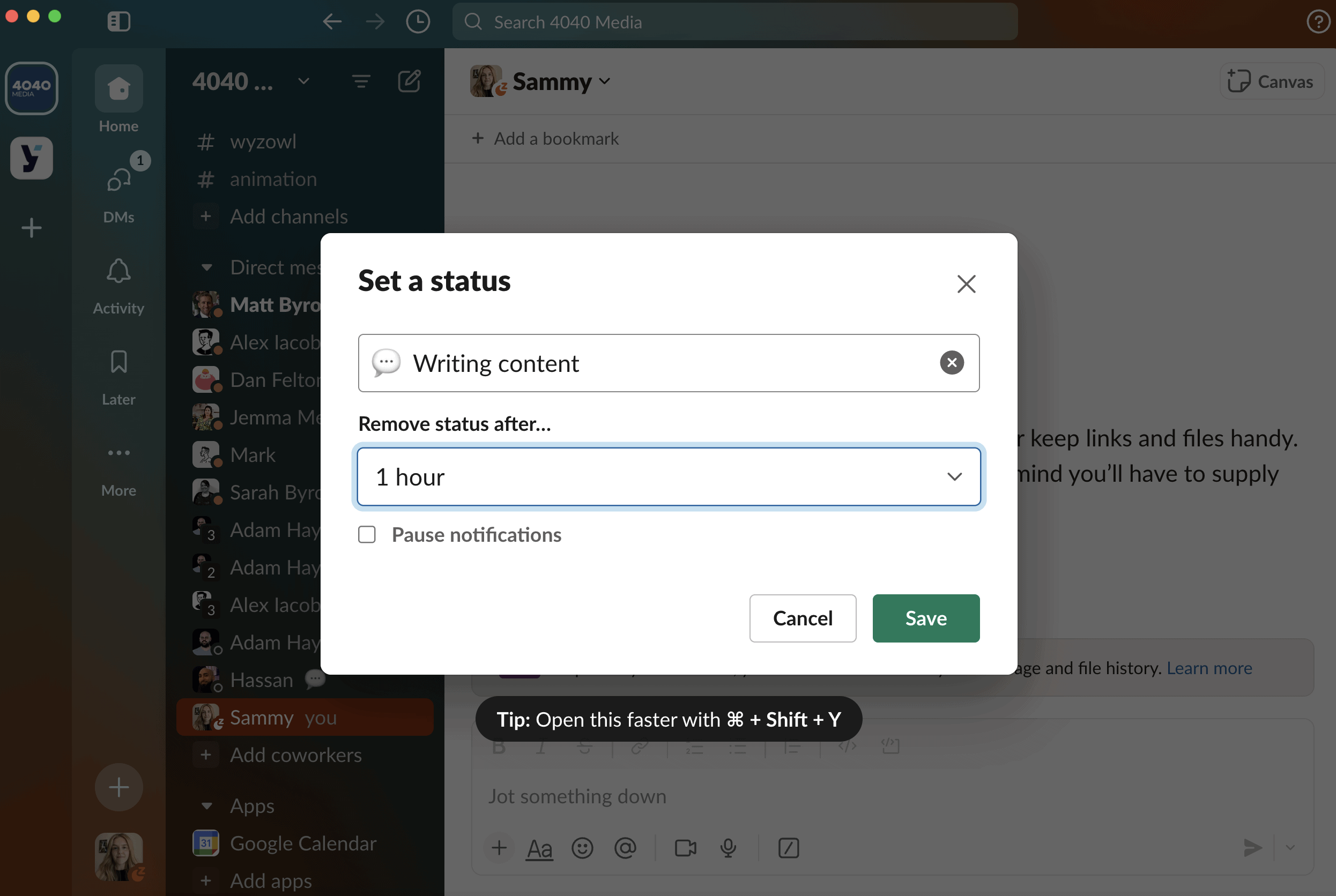
7. Give yourself the freedom to procrastinate
It may sound counter-intuitive, but blocking out periods of time to procrastinate could actually cut down the amount of time you waste throughout the day.
There is a time management technique based around this idea, called the Pomodoro Technique. The method is simple. You work for 25 minutes and then take a 5 minute break.
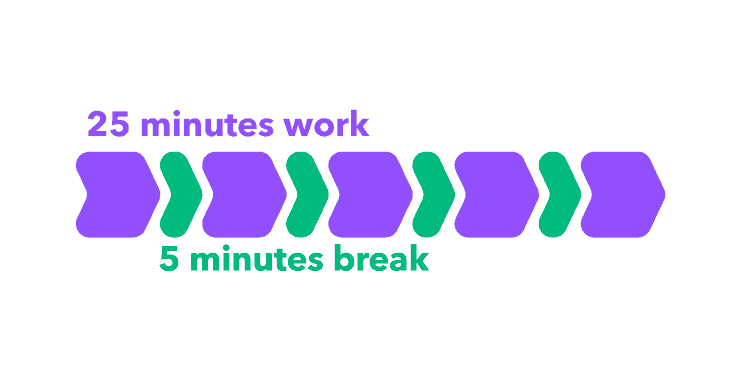
It’s called the Pomodoro Technique after the tomato-shaped kitchen timers of the same name. The timer is key to this technique as it acts as a reminder to tell you when to stop working and when to start again.
Of course, you don’t need to rush out and buy a physical timer. You can use a site like Pomofocus or Tomato Timer to keep track of your time.
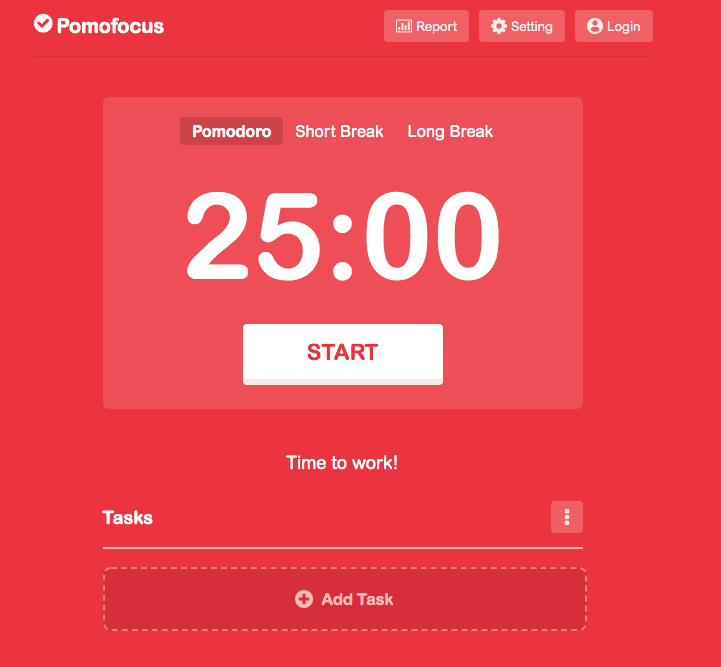
Taking breaks has actually been proven to have a positive impact on productivity. According to a study by the Draugiem Group, the most productive employees don’t work more hours, they simply take more breaks!
On average, the workers with the highest productivity worked for 52 minutes then took a 17 minute break.
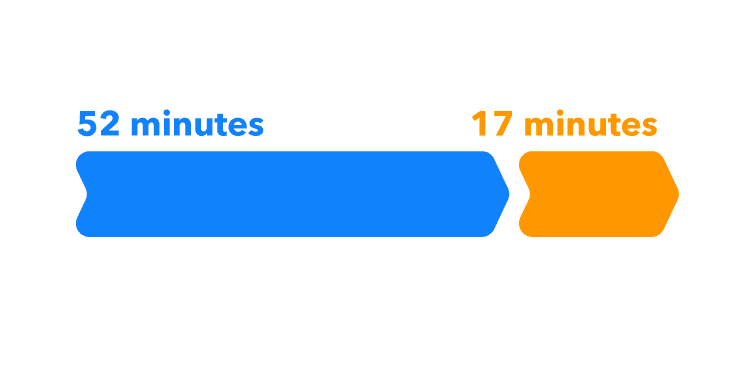
8. Visualise your tasks
When you’re trying to be more productive, it’s not necessarily about getting up super early so that you have more time in the day, it’s about making the most of the time you have.
In other words, every second counts. And when you consider that our brains can process visual information 60,000x faster than text, it makes sense that by visualising your tasks you’ll be able to save time and be more productive.
This is the basis behind the Kanban method – a workflow management strategy, originally used in the manufacturing industry.
Kanban boards are designed so that you can see all of your tasks at a glance. Tasks are also divided into columns, traditionally labelled “To-do”, “In Progress”, and “Done”. These columns allow you to quickly see where you have bottlenecks, and what you need to prioritise.
When you open a project on Project.co, you can view your tasks as a list, on a scheduler or calendar view, and as a kanban board.
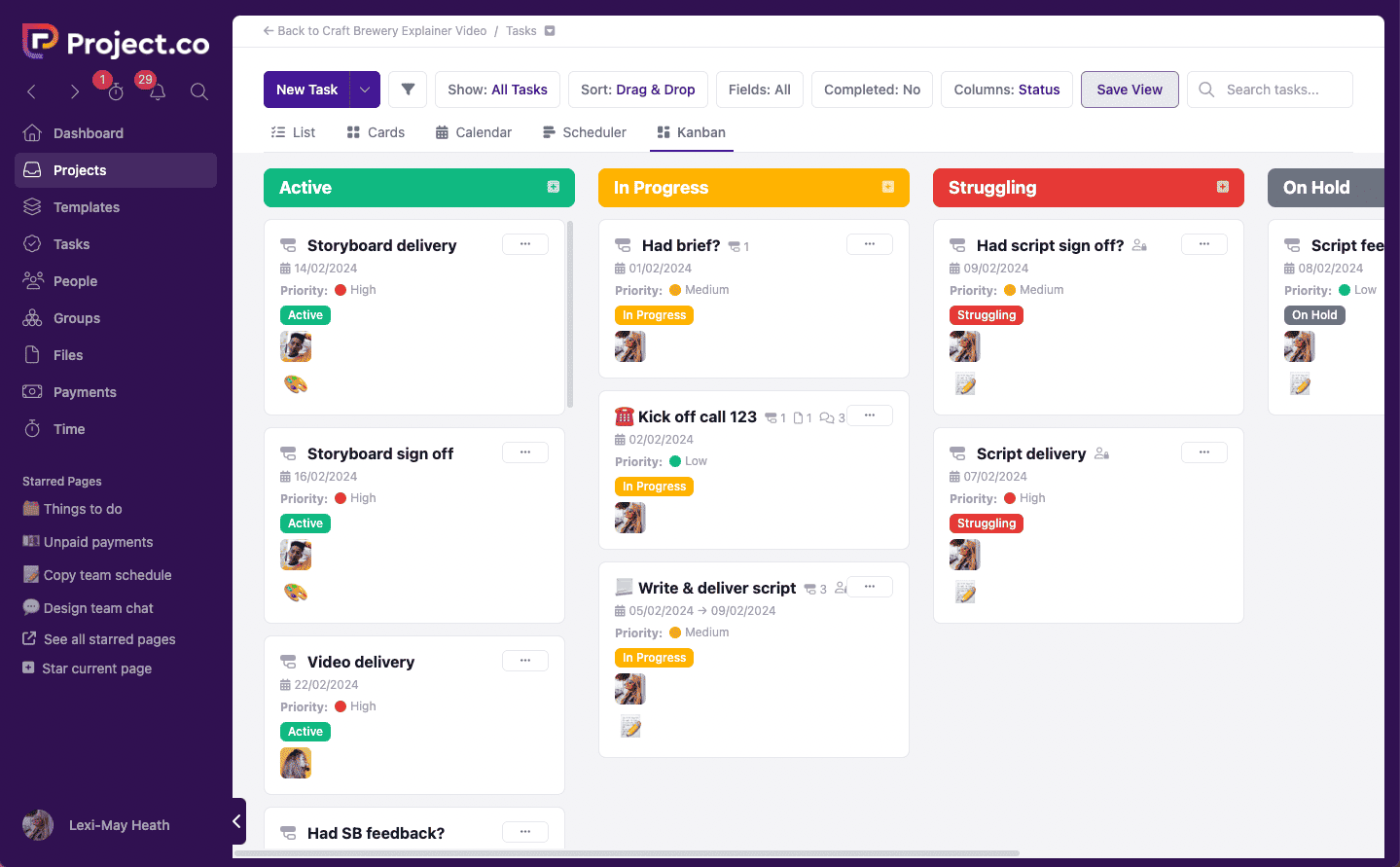
Our kanban boards have a simple drag-and-drop functionality, so you can easily move tasks from one column to the next – and you can also personalise the columns to suit your business.
9. Implement the Eisenhower matrix
Like the Pomodoro Technique, the Eisenhower Matrix is also a time management technique designed to improve productivity.
The matrix helps you to prioritise your tasks by splitting them into four categories. Tasks can be:
- Urgent and important
- Urgent but not important
- Not urgent but important
- Not urgent and not important
After splitting your tasks between the four categories in the matrix, you’ll have a better idea of what to prioritise, what to schedule, what to delegate, and what to delete:

10. Listen to productive music
We all know how much our surroundings can impact our productivity. If you’re in a noisy, uncomfortable space, it’s unlikely that you’ll be able to concentrate on your work.
But did you know that the right kind of noise can actually boost your productiveness?
Listen to the binaural beats video below to see what you think:
Binaural beats aren’t the only sounds that can help you improve your productivity. Apps like Noisli allow you to create a relaxing environment – based on the sounds you enjoy – so you can eradicate distractions and really get stuck into your work.
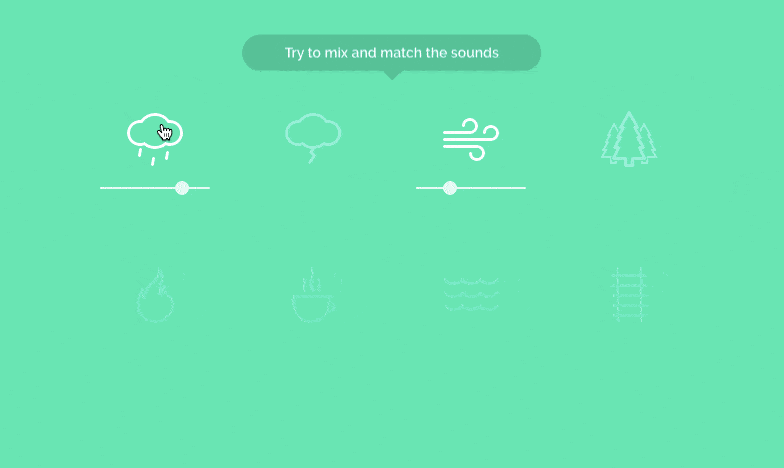
And if music is more your thing, there are companies – like Focus At Will – that specialise in personalised playlists that are said to help you focus based on your personality.
All you need to do is take a short quiz to find the best type of music to help you focus:

11. Utilise time-blocking
At the top of this article we talked about the possibility of blocking out time throughout the day for checking emails.
Time-blocking is the process of doing this for your whole day. The idea is that you schedule out ALL of your tasks for the day, from the big projects and long meetings, to the short coffee breaks.
Here’s an example of a time-blocked calendar:
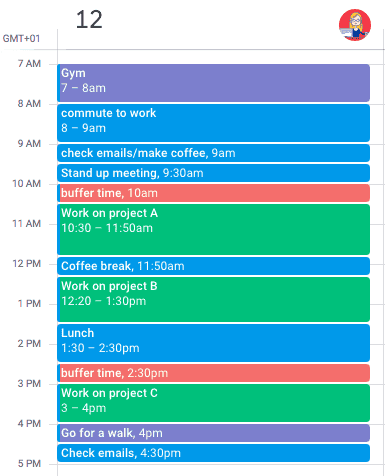
Time-blocking is a great way to increase productivity by minimising distractions and reducing the mental pressure that comes with constantly trying to multitask.
As you can see from the above example, colour-coding can also help you to manage your tasks for the day with time-blocking. The tasks for this worker are coded as follows:
- Purple = self-improvement tasks
- Blue = regular, daily tasks
- Green = project work
- Red = buffer time
12. Go for a walk
If you’re struggling to get into a task or to solve a problem, sometimes the worst thing you can do is stay chained to your desk.
Getting away from your desk – either for a change of scenery or some fresh air – can help to boost your productivity!
13. Use your commuting time effectively
If you commute to and from work and currently don’t use that time for anything, congratulations!
You just gained some of your life back.
By using your commuting time effectively, you can make the rest of your day easier. If you ride the train or bus to work, consider checking your emails before you get to the office.
And if you drive, listening to an audiobook could be a great way to squeeze in some extra learning on the go.
14. Eat the frog
This is a term often attributed to Mark Twain. The quote is as follows:
The translation for this is: get your most difficult task out of the way first!
When we have a difficult or even just an unwanted task in front of us it can really drain our productivity by causing us to procrastinate.
According to experts at Carleton University and the University of Sheffield, procrastination is an issue with managing our emotions, not time.
If we have a task that we don’t want to start then we try to make ourselves feel better by doing something that will make us momentarily happy, for example, checking social media or watching funny videos.
By “eating the frog” first, we can save ourselves a lot of wasted time and energy later on!
15. Just give up
Okay, we don’t really mean that!
However, when you do find yourself really struggling with a task, sometimes the best thing you can do is drop it and focus on something else for a while.
Then you can come back to the task at a later date or time and look at it with a fresh perspective, and hopefully some new ideas!
This is a tactic used by many successful writers when faced with ‘writer’s block’ – a condition that slows down or puts a full-stop to any creative activity. One such writer is Neil Gaiman, who is quoted on his blog as saying:
Although this applies to writing, there’s no reason why you couldn’t also apply it to any task you’re working on.
Final thoughts
Productivity can sometimes feel like an elusive state. It may seem as though some people are just born productive and some people are not.
But that’s not the case. Productivity comes from consistency. It’s continuous hard work, but luckily there are some hacks that can make it easier for you to be more productive.
Start your journey towards being more productive right now with our project management tool. On average, people who use Project.co save around 2 hours per day on unproductive work!

